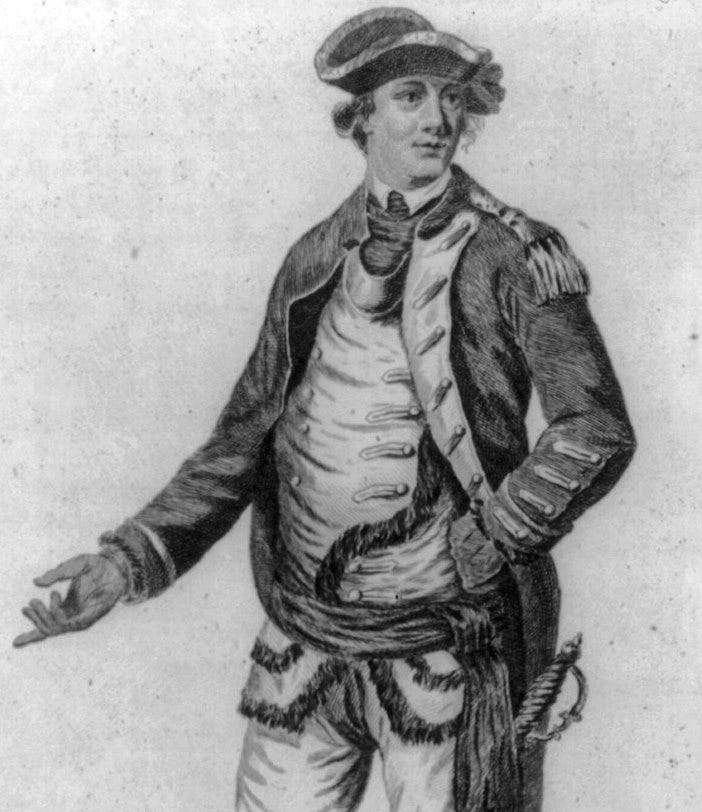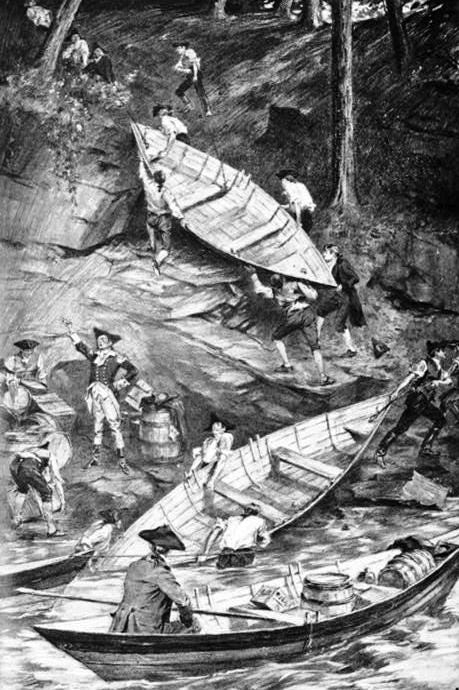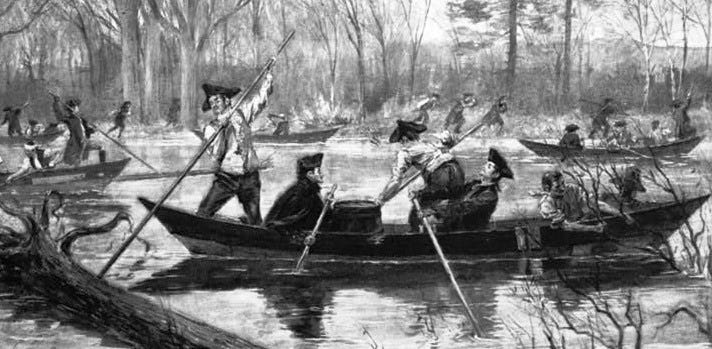One lesser-known aspect of the Revolutionary War is the patriot invasion of Canada in 1775. It was the Americans’ first offensive move, a daring attempt to capture a vast area of the continent.
The main army advanced downstream along the St. Lawrence River toward the fortified city of Quebec. A second prong of the attack, commanded by the novice colonel Benedict Arnold, sailed to Maine. The men then trudged up the rugged Kennebec River into the mountains, floating their supplies in boats. Their goal was to surprise Quebec City from the south.
The following are excerpts from my book GOD SAVE BENEDICT ARNOLD: The True Story of America’s Most Hated Man (coming in December). The remarkable expedition was a reminder of the daily suffering that is as much a part of war as combat.
A thousand men were forcing their way forward on a narrow trail, hauling their equipment in boats. The venture was so improbable, so audacious, that the enemy could barely conceive of the threat.
But now, all was going wrong. Before they reached Norridgewock, they “were often obliged to haul the boats after us through rock and shoals,” noted Pennsylvania rifleman George Morison, “frequently up to our middle and over our heads in the water; and some of us with difficulty escaped being drowned.”
Although it was still early in the journey, their hastily made boats were “so badly constructed, that whether in or out of them we were wet.”
Late September and they were already feeling the breath of winter. "What we most dreaded," wrote Abner Stocking, a 22-year-old Connecticut private who had fought at Bunker Hill, "was the frost and cold from which we began to suffer considerably."
In the brittle evening air, they heard the honking of great wedges of geese heading south. Nightly frosts had made the hardwood trees explode in orange and yellow. Now the leaves were taking flight in the wind. Now it was the first of October. Now they were finding their wet clothing frozen as thick as panes of glass in the morning—"very disagreeable," a soldier recorded. Now they were entering the limitless woodland that still dominated the continent.
“Now,” wrote Private Caleb Haskell, “we are learning to be soldiers.”
Two women accompanied the army as it struggled through the swamps. John Henry, the young rifleman, noted that Mrs. Grier, the wife of a sergeant in his division, was a “large, virtuous and respectable” woman—she was nearly six feet tall. Wading through the swamp, she lifted her skirts above her waist to avoid getting the fabric wet. No one “dared to intimate a disrespectful idea of her,” Henry declared. The young soldier was “humbled, yet astonished at the exertions of this good woman.”
Jemima Warner had also kept up with the army, as hardy as any of the soldiers. As she struggled along the trail, she realized that her husband had taken ill and fallen behind. She returned up the path “with tears of affection in her eyes” and found him lying near death. She sat with him until, as one soldier put it, he “fell victim to the King of Terrors.” Unable to bury him, she covered the body of her beloved with leaves. She picked up his gun and powder horn and walked on through the wilderness.
On the first day of November, Dr. Senter noted, the troops were approaching “the zenith of distress.” The famished men were learning a lesson that has held through history. A soldier’s duty is not only, not even mainly, fighting. More often it consists of walking forward when hungry, performing one’s duty while in pain, and persevering in the face of the most intense hardship. Men ate moss, candles, lip salve, and broth from boiled shoes.
They began to descend the Chaudière Valley on foot, climbing down a broken terrain of humps and gullies. They kept up no pretense of an orderly march. No longer an army, they were “so faint and weak,” one private recorded, “we can scarcely walk.” Their officers told them that it was now every man for himself.
All had been on half rations for at least a week. Some had not eaten anything for several days. The terrain was inhospitable. Their resources were drained. Their feet were made of lead. To mount a small rise was to climb a mountain. To descended a rocky slope was to risk a dangerous fall. Soldiers reeled as if inebriated. Hunger, exertion and the enormity of the snow-covered wilderness cast them into a lightheaded, dreamlike state of mind. “That sensation of mind called ‘the horrors,’ seemed to prevail," wrote Private Henry.
One of their worst experiences was the necessity of abandoning fallen comrades. Their shared ordeal had formed extraordinary bonds among the men. Yet, if a comrade fell, the others lacked the strength to carry him farther or even to help him to his feet. In spite of his pleas, they had to pass by and leave him to “the mercy of the woods.”
In describing his reaction, rifleman Morison hinted at a persistent effect endured by soldiers of all times. Long after the ordeal, he could not keep the men’s faces out of his thoughts. They “left impressions on our minds which nothing but death can erase.” Abner Stocking noted, “My heart was ready to burst and eyes to overflow with tears when I witnessed distress which I could not relieve.”
With evening, the darkness of death seemed to descend on the men. Hollowed out by hunger, they camped and built fires. They fell asleep to the relentless sound of rushing water and awoke to another day of famine. Feeling they could not go on, they went on.
SAVE THE DATE FOR TALKS ABOUT GOD SAVE BENEDICT ARNOLD
Tuesday, December 5 — 6:30 pm: Morton Library (Oblong Books) Rhinecliff, NY
Wednesday, December 6 — 6:30 pm: Ridgefield Historical Society 353 Main St., Ridgefield, CT
Thursday, December 7 — 6:30 pm: Anderson House (Society of the Cincinnati)
2118 Massachusetts Avenue, NW, Washington, DC
Saturday, December 9 — 11 a.m.: Lake George Battlefield Alliance, Holiday Inn Resort Lake George, New York









Another great part of History that you've written Jack. Was is a terrible thing for anyone to be a part of and will be happy that one day there will be no more war. Thank you
Beautifully written. Thank you.